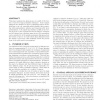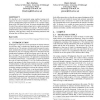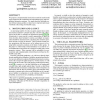141
click to vote
ICAIL
2005
ACM
15 years 7 months ago
2005
ACM
The Dutch Tax and Customs Administration (DTCA) is one of many organizations that deal with a multitude of electronic legal data, from various sources and in different formats. In...
129
click to vote
ICAIL
2005
ACM
15 years 7 months ago
2005
ACM
The potential of knowledge-based technological support for work in the legal domain has become widely recognized in recent time. This paper argues for an approach that is meant to...
121
click to vote
ICAIL
2005
ACM
15 years 7 months ago
2005
ACM
We present a Question-Answering (QA) system for Portuguese juridical documents. The QA system was applied to the complete set of decisions from several Portuguese juridical instit...
105
click to vote
ICAIL
2005
ACM
15 years 7 months ago
2005
ACM
This paper analyses the phenomenon of a shift of the burden of proof in legal persuasion dialogues. Some sample dialogues are analysed of types of situations where such a shift ma...
141
click to vote
ICAIL
2005
ACM
15 years 7 months ago
2005
ACM
d on Dung’s [4] abstract argumentation system • arguments: trees of chained defeasible inferences • aim: determine the status of a query given a belief base • incorporation...
125
click to vote
ICAIL
2005
ACM
15 years 7 months ago
2005
ACM
Computational law is an approach to automated legal reasoning focusing on semantically rich laws, regulations, contract terms, and business rules in the context of electronicallym...
124
click to vote
ICAIL
2005
ACM
15 years 7 months ago
2005
ACM
Quotation and subsequent disquotation of propositional content sentences has been proposed for, and has some attractive features for, representing content sentences embedded in co...
120
click to vote
ICAIL
2005
ACM
15 years 7 months ago
2005
ACM
We describe a set of experiments using machine learning techniques for the task of extractive summarisation. The research is part of a summarisation project for which we use a cor...
107
click to vote
ICAIL
2005
ACM
15 years 7 months ago
2005
ACM
We propose a computationally oriented non-monotonic multi-modal logic arising from the combination of temporalised agency and temporalised normative positions. We argue about the ...
ICAIL
2005
ACM
15 years 7 months ago
2005
ACM



